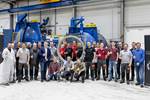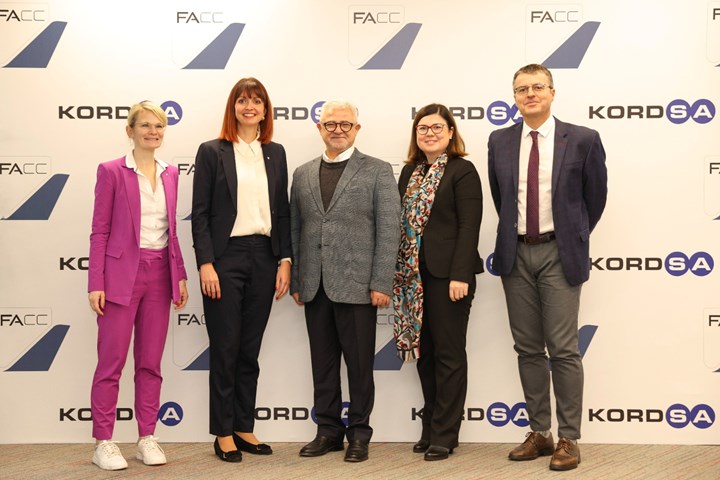Kordsa to provide fire-retardant products for FACC aerocomposite components
The long-term agreement covers the supply of fire-resistant, sustainable, epoxy-based products for use in aircraft cabins.
Martina Kneißl, Sabine Lenzbauer, İbrahim Özgür Yıldırım, Müge Yenmez and Denis Granger. Photo Credit: Kordsa
Kordsa (Izmit, Turkey) has signed a long-term commercial collaboration agreement with FACC AG (Ried im Innkreis, Austria). Under this agreement, Kordsa will introduce its epoxy-based product that meets stringent fire resistance and sustainability criteria in the aviation sector to the FACC ecosystem. The product, bearing the signature of the Composite Technologies Center of Excellence in Turkey, will be used in the production of cabin interior components in civil aviation.
Kordsa notes that its sustainable products enable the transition from phenolic-based volatile chemicals to flame-retardant, epoxy-based chemicals in cabin interiors. They prevents the emergence of harmful substances throughout various processes, from raw material production to the development of final components. The products also provide a significant cost and supply advantage by streamlining operational product development processes. In addition, they demonstrate high performance in one of the aviation industry’s most critical and challenging criteria — flammability — ensuring the highest level of passenger safety in fire-related incidents or accidents.
“The path for Kordsa to become one of the world’s leading companies in advanced materials involves seeing sustainability as a business model,” Kordsa CEO İbrahim Özgür Yıldırım says. “The vision we describe as ‘Reinforcing Life’ is not just a narrative summarizing Kordsa’s development; it is a journey indicating Kordsa’s contribution to the world, humanity and the ecosystem.”
Related Content
-
TU Munich develops cuboidal conformable tanks using carbon fiber composites for increased hydrogen storage
Flat tank enabling standard platform for BEV and FCEV uses thermoplastic and thermoset composites, overwrapped skeleton design in pursuit of 25% more H2 storage.
-
CompoTech uses integrated loop technology to create high-performance mountain bike
CompoTech features its CDuro Epona mountain bike fitted with custom suspension forks, manufactured using its AFL winding and integrated loop technologies.
-
Plant tour: Albany Engineered Composites, Rochester, N.H., U.S.
Efficient, high-quality, well-controlled composites manufacturing at volume is the mantra for this 3D weaving specialist.














